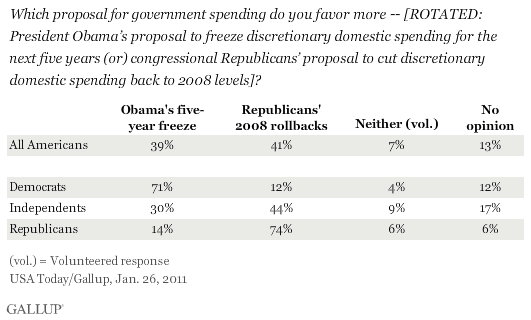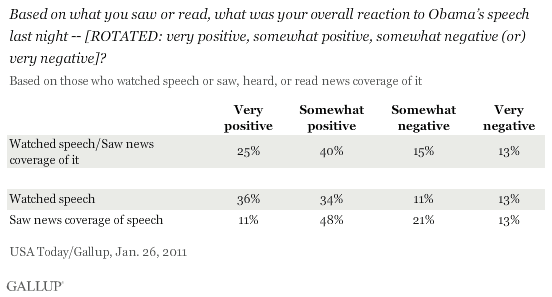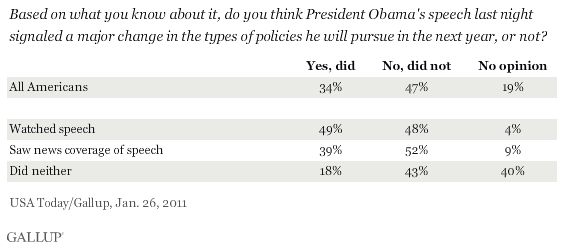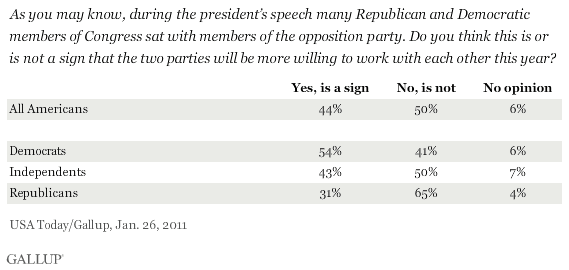PRINCETON, NJ -- President Obama's proposal to freeze discretionary domestic spending for five years was one of the key elements of his State of the Union address. Americans are generally divided when asked whether they favor his proposal (39%) or the Republicans' plan (41%) to roll discretionary domestic spending back to 2008 levels. Democrats and Republicans generally line up behind their party's plan. Independents tilt toward the GOP proposal, though many do not have an opinion either way.

These results are based on a Jan. 26 USA Today/Gallup poll conducted the day after Obama's State of the Union address on Tuesday.
Overall, 34% of Americans say they watched the speech, and another 28% saw, heard, or read news coverage of it.
The poll finds that 65% of those who watched or saw coverage of the speech rate it positively, including 25% who say they have a very positive opinion of it. Those who watched the speech are more positive about it than are those who only saw news coverage of it.

That more positive response to the speech among those who watched is due in large part to the composition of the viewing audience for it. As is typical of most presidential speeches, the viewing audience for Obama's speech was more friendly than not -- 41% of those who watched the speech are Democrats, 33% independents, and 23% Republicans.
The speech afforded the president a prime opportunity to tell Americans how he plans to lead the country in the wake of the midterm elections, which returned the Republicans to majority status in the House.
However, Americans in general do not expect Obama to make significant changes in the types of policies he will pursue in the next year. Thirty-four percent say the speech was a signal that Obama will change course, but 47% disagree. About one in five have no opinion.
Those who watched the speech are more likely to believe it is a sign of a new Obama policy course, though even this group is divided in its views.

In addition to Obama's new proposals, this State of the Union address was also notable for the decision of some Democrats and Republicans to sit with members of the opposition party in the House chamber as they watched the speech -- a departure from the usual tradition of the parties sitting separately. Americans are divided as to whether this is a sign that the parties will be more likely to work together, with 44% believing it is and 50% saying it is not.
Democrats are more optimistic than Republicans or independents that the gesture is a meaningful sign of increased bipartisanship in the future.

Implications
Americans reacted positively to Obama's State of the Union address but are less convinced that he will change the types of policies he will pursue. They also are not convinced that his plan to control government spending -- one of the key elements of his speech -- is better than the plan laid out by congressional Republicans.
Survey Methods
Results for this USA Today/Gallup poll are based on telephone interviews conducted Jan. 26, 2011, on the Gallup Daily tracking survey, with a random sample of 1,004 adults, aged 18 and older, living in all 50 U.S. states and the District of Columbia, selected using random-digit-dial sampling.
For results based on the total sample of national adults, one can say with 95% confidence that the maximum margin of sampling error is ±4 percentage points.
Interviews are conducted with respondents on landline telephones (for respondents with a landline telephone) and cellular phones (for respondents who are cell phone-only). Each sample includes a minimum quota of 150 cell phone-only respondents and 850 landline respondents, with additional minimum quotas among landline respondents for gender within region. Landline respondents are chosen at random within each household on the basis of which member had the most recent birthday.
Samples are weighted by gender, age, race, education, region, and phone lines. Demographic weighting targets are based on the March 2010 Current Population Survey figures for the aged 18 and older non-institutionalized population living in continental U.S. telephone households. All reported margins of sampling error include the computed design effects for weighting and sample design.
In addition to sampling error, question wording and practical difficulties in conducting surveys can introduce error or bias into the findings of public opinion polls.
View methodology, full question results, and trend data.
For more details on Gallup's polling methodology, visit www.gallup.com.
